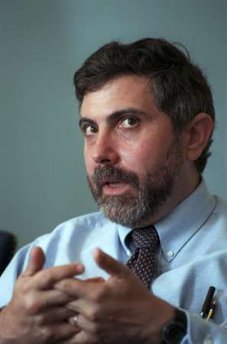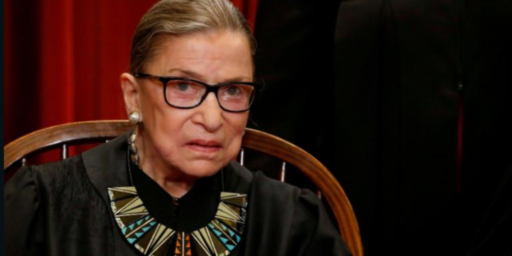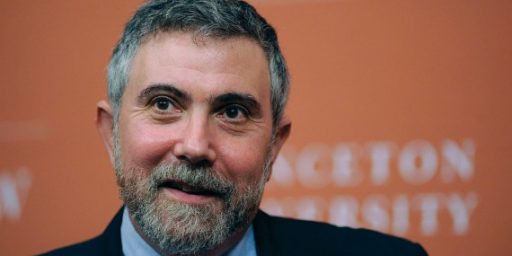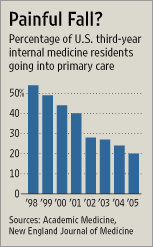Professional Failure
Or this post could be titled how doctors routinely fail to predict illnesses, diseases and injuries. It strikes me that this is one of the main problems with health care in this country. If only doctors could get better at practicing their art then we might not have such a problem with run away health care costs. Try it, go into your doctor and ask, “When am I going to get cancer? When am I going to have a heart attack? When am I going to have an ulcer? When am I going to suffer a broken leg?”
Okay, that’s a bit silly isn’t it? Well so was Paul Krugman’s article on how the economics profession got it all so wrong with regards to the recent financial crisis. In his New York Times article Krugman wrote,
Few economists saw our current crisis coming, but this predictive failure was the least of the field’s problems.
But is it the job of economists to predict when recessions are going to occur? Is it the job of the doctor to be able to answer with any degree of accuracy, “When am I going to get cancer, and what kind will it be?”
That is one of the comments David K. Levine makes in his article replying to Krugman. Levine starts right off not pulling any punches,
I was reading your article How Did Economists Get It So Wrong. Who are these economists who got it so wrong? Speak for yourself kemo sabe. And since you got it wrong – why should we believe your discredited theories?
While this initial jab is amusing Levine goes on to make several more good points as to why we shouldn’t accept what Krugman is saying without at least taking a look around. For example, Narayana Kocherlakota looks at the current state of macro economics and finds that many of the objections raised by Krugman are not accurate. Or take a look at an earlier and saner Paul Krugman who wrote very eloquently in defense of economic formalism. I would also suggest the Slate article The Accidetnal Theorist where Krugman shows the benefits of making simplified models of the real world.
The picture becomes increasingly clear to him [a famous journalist]: Supply is growing at a breakneck pace, and there just isn’t enough consumer demand to go around. True, jobs are still being created in the bun sector; but soon enough the technological revolution will destroy those jobs too. Global capitalism, in short, is hurtling toward crisis. He writes up his alarming conclusions in a 473-page book; full of startling facts about the changes underway in technology and the global market; larded with phrases in Japanese, German, Chinese, and even Malay; and punctuated with occasional barbed remarks about the blinkered vision of conventional economists.
Perhaps we should just think of Krugman as a hack journalist these days.






For years I have heard economist predict big trouble as unsustainable entitlement spending keeps rolling along. But do policy makers do anything to avoid that predicted outcome? Of course they don’t and I doubt they would have listened if more economists forewarned us about the last crisis. Some did warn us and who listened to them?
Better analogy… If you smoke two packs a day, weigh 300 pounds and run a cholesterol of about 500 we can predict that you will probably have a heart attack. Maybe not when exactly, but odds are good you are going to have one.
The fact that we had record levels of personal debt, mortgages being issued on a dont ask dont tell basis and many trillions floating around in CDS’s in an unregulated shadow banking system should have triggered many more warnings of a crisis, not just some bubble popping. If economics/economists are not able to make predictions about general directions in the economy, how can we use it to make plans for the future? Why should I believe, even though there is economic theory to support it, the belief that opening up markets to the interstate sale of health insurance will decrease costs? After all, we have no working model, just a theory that it might work in health care since it has often worked in other areas. Maybe economics is best used as a means to explain what has happened and not useful as a predictor.
As an aside, medicine is actively working to do much of what you describe.
Steve
When? It isn’t just, “Oh, someday…maybe.” Can we get a year at least. C’mon, have some balls and put them on the chopping block and tell us what year of life. And none of this phoney-baloney probability distribution shit.
So is economics, and there is a saying in economics, “Progess is made one death at a time.” That is as the older economists who become staid and rooted in the past cork off the younger people who have new ideas and are sometimes brash and even a bit disrespectful of the older crowd get more opportunities. Krugman has, IMO, entered the older crowd.
Even when you go to the doctor with a specific issue often times they can’t figure out what’s wrong. They’ll run hundreds of dollars worth of tests and if they still can’t find the problem they either tell you to see a shrink because it’s in your head or they’ll make something up. I lived with gall bladder attacks for 8 years before a doctor figured out what was wrong and that was at the ER in the middle of the night during an attack.
My point is – There are lots of people in lots of jobs that actually suck at their jobs or the science is just too imperfect to predict or figure out the problems. Just because you’re a doctor doesn’t mean you’re smart or good at your job and I’m betting the same goes for economists, engineers, computer programers etc..
Let me see. I only took the required amount of economics in school. Econ 101. A little marketing and the other stuff. Long ago. What I understand is that if you loan out money to people who cannot repay it, you will go broke. If you have an organization like ACORN which pressures banks to make bad loans they are partly responsible. If one understands what Alinsky stood for and how this country is being attacked by the radical left and has been for some time you will know this is not an accident. When Schumer leaked that a certain bank was in trouble, the fuze was lit. You can believe it is not or cannot happen here, but it is.
It’s really the psychologist and the economist that have the most in common…
Each only needs two things to ply his “trade”…
A diploma and an opinion!
“”They’ll run hundreds of dollars worth of tests and if they still can’t find the problem””
They may be “worth” hundreds , but they usually cost thousands!! [lol]
Well, if economists cannot predict the future, how well can they prescribe changes to create (or guard against) futures?
I think that’s the rub. They still want to tell us what to do.
Shorter: An economist cannot tell me next year’s unemployment rate, but he can tell me what to do about it.
That’s how politics gets wrapped in economic hand waving.
3rd try: Steve doesn’t like Krugman because he is a “liberal” economist. Krugman presumably doesn’t like Steve because he is a libersomething economist.
When economic prescription splits along political lines, you know it isn’t working.
We can’t predict a biologist’s politics from their population model. We can’t predict an architect’s politics from his buttressing methods … but econ is “special.”
Economics does not take into account the basic greed of humans. Greenspan proved this when he admitted on the record he failed to see that many on Wall Street were crooks pulling fast ones he couldn’t even understand.
Odograph,
Not at all surprising it took you three tries to get your thoughts in order (and amusingly aren’t you a retired doctor?), here goes.
Krugman as a liberal:
No, I used to like Krugman pre-2000. Didn’t always agree with him, but his writings were often good and thought provoking. See, that is why I linked to two of articles/essays. They are good.
Post-2000 he became insane in my book. The Bush presidency unhinged the man and he has yet to self-correct.
Oooh, that’s almost good. Problem is that economists aren’t putting forward policies due to future prognistications, but looking back at where things went wrong and trying to put in place policies and institutions to correct for some of the systemic problems.
For example, if you know that there is a problem with adverse selection as a contributing factor to the financial crisis and you have a way to reducing or eliminating said adverse selection why not do it?
Further, it would be silly to think that such policies would prevent future crises. That is likely never going to happen. The goal is to make such crises less common. Additionaly that kind of rhetoric is the kind of nonsense you get from politicians. Which brings us to this,
Two comments.
One, I bet you couldn’t tell what the politics of David K. Levine are by looking at one of his models…just like with the population biologist. Can you tell by the article I linked too, go ahead give it a shot. Second, economic policy is in the realm of politics so you are going to get a political seperation whether you want it or not. Same would be true of architecture if it too were to enter the realm of political policy.
Same thing for doctors, what a bunch of idiot hacks. They can’t tell me what my weight will be, whether or not I’ll have cancer, or heart problems, but they will tell me what to do about it. Bunch of busy bodies engaged in stupid hand waving.
See what I did there? I doubt it.
Mr. Prosser,
Actually yes, they do. In fact maybe too much.
Perhaps they do. But as Kocherlakota writes in the piece you cite:
Could a mathematical model adequately capture greed (or fear or love or any of the fundamental drivers of human behavior, economic or otherwise)?
Steve wrote:
Weren’t you the one who worked pre-stimulus estimates of unemployment pretty hard in your econo-political argument?
I’ll leave the rest of the point by point and really rest on what we all know … that macroeconomic arguments break down into political positions held by well-known camps.
For a certain sort of problem or discussion, economics is (as someone said) politics with numbers.
Problems like: bailouts, stimulus, welfare, health care, ….
BTW, educated as a chemist, currently a semi-retired Java programmer.
Most shocking thing I read:
Economists don’t incorporate personal self interest into their theories. WTF?
The economist I find myself most closely aligned with, a certain M. Friedman, recognizes this self interest as integral and fundamental to his thinking.
As for greed vs self interest. As I snarked to Dave S recently, the ability to separate self interest from greed is a mind reading exercise and talent I find supernatural.
@Drew
I think you wrote it was something “with which I’m not familiar” — which made me smile.
Sam,
Yes. The standard model of humans in economics is that of a utility maximizers, a welfare maximizing agent. All you care about is increasing you’re own welfare. You don’t care about the welfare of others, even family.
So, on the one hand economists are taken to task for using this stilted view of human behavior, then on the other taken to task for not using it enough.
Make up your mind please.
Odograph,
As you recall I was pretty much against such policies now wasn’t I? Further, this is where politics and economics mix which is unlike architecture (so yeah, in that regard economics is “special” which should be obvious). And yes, it breaks down into different camps. But it isn’t clear who is in which camp. For example, would you be surprised to learn that David Levine is a liberal who has written in the past in defense of welfare and not some ardent libertarian? But, here he is saying, “Look the economy isn’t disintigrating, maybe we don’t need to spend all of that stimulus money and from a fiscal policy stand point that might a good thing.” Your desire to see ideological boogey men is starting to remind me of Bernard.
Steve,
The interesting thing for me was that the projection was published pre-stimulus, and you used it, post stimulus with almost equal weight to later facts.
Your argument was that since the projection said unemployment was going to be X, and actual employment was higher, Obama’s policies must have made it higher. Talk about absolute confidence in economic projection …
Don’t you think that’s a little ironic, given your role here?
You are on OTB to make political argument and your specialty is making that argument with an economic framework. That’s really what Krugman does in his venue, and Mankiw in his, and Cowen in his.
It’s a little like Casa Blank at this point. Should we be shocked, shocked, to find economists playing at politics? Or is it econo-politics all along?
No, my argument was that the stimulus wasn’t working, I’d argued beforehand that the stimulus was unlikely to do much given how it was structured. Thus, the stimulus was bad policy because it would add to the debt and provide little to no benefit–i.e. almost all cost no benefit.
But for you, and Bernard, ideology trumps everything else. I give you a liberal economist who doesn’t think that the current stimulus is necessary, at least in the out yers, and that additional stimulus is crazy. Point being that it isn’t simply just ideology at work here.
That is not a cogent answer. You can only argue it wasn’t working if you take the predicted curve as “true.”
This is macro-economic-political argument in a nutshell. You take a made-up number and then rather than treating it with skepticism, you at least pretend to believe it totally in order to advance your argument.
Do I have an ideology? Political compass put me dead center. An ideology of moderation? Or do you meand that I spot ideology and respond to that?